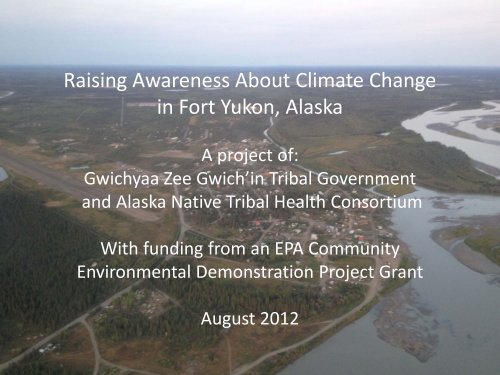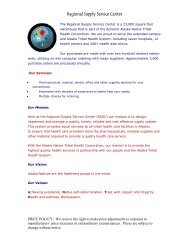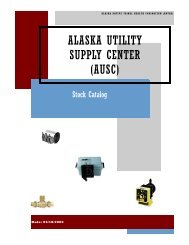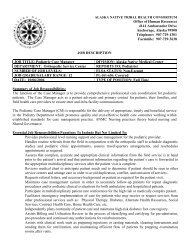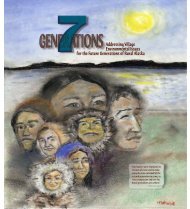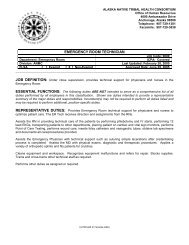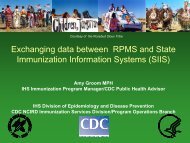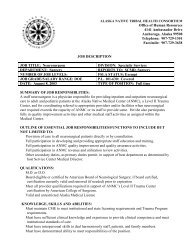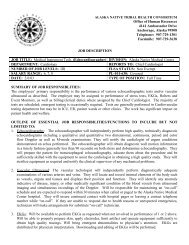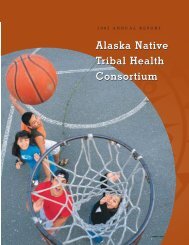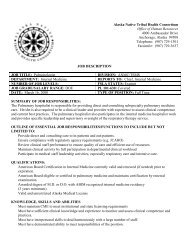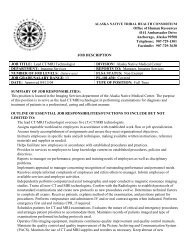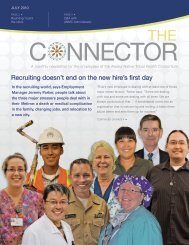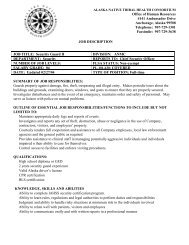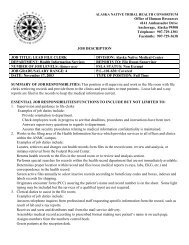Raising Awareness About Climate Change in Fort Yukon ... - ANTHC
Raising Awareness About Climate Change in Fort Yukon ... - ANTHC
Raising Awareness About Climate Change in Fort Yukon ... - ANTHC
You also want an ePaper? Increase the reach of your titles
YUMPU automatically turns print PDFs into web optimized ePapers that Google loves.
<strong>Rais<strong>in</strong>g</strong> <strong>Awareness</strong> <strong>About</strong> <strong>Climate</strong> <strong>Change</strong><strong>in</strong> <strong>Fort</strong> <strong>Yukon</strong>, AlaskaA project of:Gwichyaa Zee Gwich’<strong>in</strong> Tribal Governmentand Alaska Native Tribal Health ConsortiumWith fund<strong>in</strong>g from an EPA CommunityEnvironmental Demonstration Project GrantAugust 2012
<strong>Fort</strong> <strong>Yukon</strong> is a community of about 600 residents, located on the bank of the <strong>Yukon</strong> River.
Rocky James works for the traditional council <strong>in</strong> <strong>Fort</strong> <strong>Yukon</strong>. He has been <strong>in</strong>terview<strong>in</strong>gresidents about climate change.
Albert Thomas is one of the people who Rocky has <strong>in</strong>terviewed. He has lived <strong>in</strong> <strong>Fort</strong> <strong>Yukon</strong> for 75 years.
There is an AC store that provides dry goods and produce <strong>in</strong> <strong>Fort</strong> <strong>Yukon</strong>, but prices are high and people rely onsubsistence harvest for much of the food they need.
Fuel is also expensive. In August 2012 the price of gas was $7,50 per gallon.
The most important food <strong>in</strong> <strong>Fort</strong> <strong>Yukon</strong> is salmon, which is taken by net and fish wheel from the<strong>Yukon</strong> and other nearby rivers.
The salmon has been decl<strong>in</strong><strong>in</strong>g for years, <strong>in</strong> particular the size and number of K<strong>in</strong>g salmon. This year thesubsistence harvest was closed due to a poor return. There is very little salmon on the dry<strong>in</strong>g racks. Thesalmon closure is creat<strong>in</strong>g a food security crisis <strong>in</strong> <strong>Fort</strong> <strong>Yukon</strong> and other communities.
Hunt<strong>in</strong>g is also an important subsistence activity, for waterfowl and land mammals.
There is a history of garden<strong>in</strong>g <strong>in</strong> <strong>Fort</strong> <strong>Yukon</strong>. This year more then ever, some people are depend<strong>in</strong>g on gardenvegetables to supplement the diet.
We know that the average monthly temperatures <strong>in</strong> <strong>Fort</strong> <strong>Yukon</strong> have been <strong>in</strong>creas<strong>in</strong>g s<strong>in</strong>ceat least the early 1960s.
Rocky James has been notic<strong>in</strong>g the rapid erosion on the <strong>Yukon</strong> River. He is wonder<strong>in</strong>g if it is related to climate change.
Some build<strong>in</strong>gs and other <strong>in</strong>frastructure are built right on the river bank.
In some places the bank is ripp<strong>in</strong>g away from the land. Is warm<strong>in</strong>g contribut<strong>in</strong>g to this?
In other areas the bank is scoured away. Is warm<strong>in</strong>g make this k<strong>in</strong>d of erosion happen more rapidly?
Some of the camps along the river have been lost to erosion.
Is the condition of the river chang<strong>in</strong>g?
Some residents say the river is becom<strong>in</strong>g more braided, and difficult to travel.
The men talk about how much the river has changed <strong>in</strong> recent years.
Lakes are dry<strong>in</strong>g out and disappear<strong>in</strong>g. This was a duck pond when Rocky was a boy.
Infestation of bark beetles <strong>in</strong> spruce trees is another concern that was discussed. <strong>Climate</strong><strong>in</strong>fluenced conditions such drought can make trees vulnerable to beetles.
Rocky uses local radio to do <strong>in</strong>terviews and broadcast <strong>in</strong>formation to <strong>Fort</strong> <strong>Yukon</strong> and other villages. Itis help<strong>in</strong>g to get people to talk and th<strong>in</strong>k about the changes <strong>in</strong> their community.
<strong>Fort</strong> <strong>Yukon</strong> residents are observ<strong>in</strong>g rapid environmental change<strong>in</strong>clud<strong>in</strong>g river bank erosion, dry<strong>in</strong>g and disappear<strong>in</strong>g lakes.Residents are concerned that these changes may be impact<strong>in</strong>gwater quality <strong>in</strong> the <strong>Yukon</strong> River and its tributaries, along withsalmon populations, lake habitat for birds, fish and other wildlife,and the health of spruce trees.Possible topics for further technical discussion <strong>in</strong>clude:• Permafrost thaw and river and lake change (Ben Jones, USGS)• Evaluat<strong>in</strong>g food security <strong>in</strong> <strong>Fort</strong> <strong>Yukon</strong> (Dr. Phil Lor<strong>in</strong>g, UAF)• Manag<strong>in</strong>g spruce bark beetles (Roger Burnside, DNR)This project provides a model for us<strong>in</strong>g <strong>in</strong>terviews and radiobroadcast<strong>in</strong>g to develop local dialogue about environment andclimate change, and to engage technical exports who can addresscommunity specific concerns.Prepared by Mike Brubaker, <strong>ANTHC</strong>


